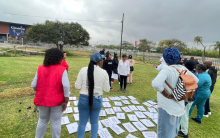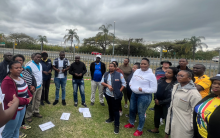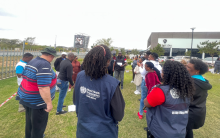WHO South Africa Strengthening Cholera Preparedness and Training in Mpumalanga and Eastern Cape
Demonstrating an extraordinary commitment to the protection of public health through collaborative efforts, the World Health Organization (WHO) South Africa worked closely with the National Department of Health (NDOH) and partners to successfully wrap up its Cholera preparedness and readiness training sessions in Mpumalanga and the Eastern Cape. These initiatives were conducted in partnership with key stakeholders, and they represented a comprehensive program aimed at enhancing Cholera preparedness and training in the provinces of Mpumalanga and Eastern Cape from August 14 to August 25, 2023.
In the face of a cholera outbreak that gripped South Africa early this year, WHO South Africa has emerged as a shining example of preparedness and collaboration, demonstrating proactive public health measures. Amidst the backdrop of Cholera cases, WHO South Africa's dedication to safeguarding public health by enhancing readiness, conducting training, and forging partnerships stands out. Globally, Cholera poses a significant public health threat, with an estimated 2.9 million cases and 95,000 annual deaths. Furthermore, Africa has experienced a concerning increase in cholera cases since mid-2021, with January 2023 alone witnessing a staggering 30% rise compared to the entire previous year. As of March 22, 2023, a disturbing 140,013 cholera cases and 3,191 deaths have been reported in 14 African countries grappling with outbreaks, including Cameroon, Nigeria, DRC, Malawi, Ethiopia, Kenya, Mozambique, Tanzania, Burundi, Zambia, Zimbabwe, Somalia, South Sudan, and South Africa.
Despite these statistics, South Africa's vigilant and swift response to the Cholera Outbreak sets a commendable example. In February 2023, the nation reported its first two cholera cases, imported from Malawi. By August 7, 2023, South Africa had documented 199 confirmed cases and 47 tragic deaths. Gauteng emerged as the most affected province, reporting 177 confirmed cases and 34 cholera-related fatalities, with 17 confirmed as cholera-related. And while South Africa is not endemic to cholera, it has encountered sporadic imported cases in recent years. The last significant outbreak occurred in 2009, following cases imported from Zimbabwe. This outbreak, which began in November 2008 in Musina, Limpopo Province, swept across all nine provinces, resulting in 12,705 cholera cases and 65 deaths, with Mpumalanga (54%) and Limpopo (43%) bearing the brunt.
South Africa's commendable track record of over a decade without a significant cholera outbreak underscores its unwavering dedication to preparedness. Recognizing the potential risks, it became imperative to evaluate and establish the current state of readiness for cholera outbreaks, forming the foundation for preparedness and response strategies.
In a proactive initiative, the National Department of Health, in conjunction with WHO South Africa and key partners, such as Medicines Sans Frontiers (MSF) and UNICEF, conducted a comprehensive Cholera preparedness training program in the provinces of Mpumalanga and the Eastern Cape. This endeavor sought to assess readiness levels, deliver training, and foster robust partnerships to reinforce Cholera preparedness. Emphasizing the critical role of preparedness and response measures in averting and managing Cholera outbreaks, this collaborative undertaking not only enhanced capacity but also forged essential alliances for effective Cholera control.
Marking, the final phase of capacity strengthening for Cholera readiness and communicable disease control, Dr. Joseph Wamala, the Emergency and Preparedness (EPR) Team Lead, extended his commendations to the NDOH for its nationwide Cholera response efforts and said, “thanks to the concerted efforts of communities, healthcare facilities, and the national response, no new cases have been reported in the last 60 days across five provinces”. As the training initiative concluded, WHO and its partners remain prepared to support post-outbreak activities, including after-action reviews and risk assessments, to enhance future readiness. WHO reaffirms its steadfast commitment to assisting the country in fortifying its preparedness and response mechanisms to prevent future cholera outbreaks.
In Mpumalanga, simulation exercises took place, providing participants with a practical and adaptable approach to establishing and operating a Cholera treatment center. This exercise offered hands-on experience in configuring different zones, managing patient flow, and addressing logistical requirements, thereby consolidating the principles of Cholera readiness, and further enhancing preparedness and response capabilities for potential cholera outbreaks.
As this comprehensive training and preparedness initiative concluded, WHO South Africa and its partners remain steadfast in their commitment to supporting post-outbreak actions. These include after-action reviews and risk assessments to enhance future readiness.
This collaborative effort in Mpumalanga and Eastern Cape serves as a testament to the power of partnerships and proactive measures in the global fight against cholera. WHO South Africa stands united with its partners, demonstrating that, together, we can safeguard public health and prevent future cholera outbreaks.








